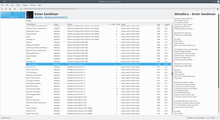JuK
JuK is a free software audio player by KDE, the default player since K Desktop Environment 3.2.[3] JuK supports collections of MP3, Ogg Vorbis, and FLAC audio files.
 Screenshot of JuK | |
| Original author(s) | Scott Wheeler |
|---|---|
| Developer(s) | Michael Pyne |
| Initial release | February 3, 2004 |
| Stable release | 3.11 (February 4, 2014[1]) [±] |
| Preview release | Non [±] |
| Repository | |
| Written in | C++ |
| Operating system | Unix-like, Microsoft Windows |
| Available in | Various[2] |
| Type | Audio player |
| License | GPL |
| Website | juk www |
JuK was started by Scott Wheeler in 2000, and was originally called QTagger; however, it was not until 2002 that the application was moved into KDE CVS, where it has grown into a mature audio application. It was first officially part of KDE in KDE 3.2.[4]
Features
Though an able music player, JuK is primarily an audio jukebox application, with a strong focus on management of music,[5] as shown by features such as:
- Collection list and multiple user defined playlists.
- Ability to scan directories to automatically import playlists (.m3u files) and music files on start up.
- Dynamic Search Playlists that are automatically updated as fields in the collection change.
- A Tree View mode where playlists are automatically generated for sets of albums, artists and genres.
- Playlist history to indicate which files have been played and when.
- Inline search for filtering the list of visible items.
- The ability to guess tag information from the file name or using MusicBrainz online lookup.
- File renamer that can rename files based on the tag content.
- ID3v1, ID3v2 and Ogg Vorbis tag reading and editing support (via TagLib).
gollark: It's not a very good battery since it's renewable, but you know.
gollark: I stuck three fusion reactors and fuel infrastructure into a compact machine and called it a "fusion battery".
gollark: Er, molten salt FISSION.
gollark: Why bother with molten salt fusion if you can just stick down a ridiculously expensive WHY-10000 fusion battery everywhere which needs power?
gollark: Doubt it.
See also
.svg.png)
References
| Wikimedia Commons has media related to JuK. |
- http://quickgit.kde.org/?p=juk.git
- http://i18n.kde.org/stats/gui/trunk-kde4/po/juk.po/
- Pinto, Henrique (February 22, 2004). "Deep inside the K Desktop Environment 3.2". Ars Technica. p. 3. Retrieved February 18, 2009.
- http://www.kde.org/announcements/changelogs/changelog3_1_5to3_2.php
- Molkentin, Daniel (June 2004). "Play and manage your music with JuK 2.0" (PDF). Linux Magazine. pp. 78–79. Retrieved February 18, 2009.
This article is issued from Wikipedia. The text is licensed under Creative Commons - Attribution - Sharealike. Additional terms may apply for the media files.
